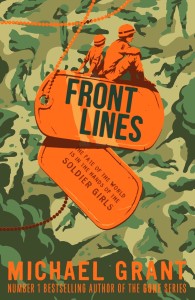Jenou Castain, age 13, stares at the paper she’s just been handed by her teacher, Mr. McSweeney. It’s her paper on the French Revolution and there is a very strange mark on it in red pencil.
Jenou leans to her right, bringing her within whisper-shot of Rio Richlin. Jenou holds the paper so Rio can see it.
“What’s that?” Jenou asks.
“Why, that is an A minus,” Rio says. She grins and nods, a combination that gives her an almost motherly air of pride.
“Huh,” Jenou drawls. “I don’t think I’ve ever seen one of those before.”
Mr. McSweeney who, like the best teachers, has eyes and ears in the back of his head says, “If you won’t be still, Miss Castain, I can always change it to a letter more familiar to you.”
“Nope. No need for that,” Jenou says and makes a zipping motion across her mouth.
After class Jenou and Rio walk at a dawdling pace toward their respective homes, a very familiar path that takes them through the town square where a band is warming up, emitting comical bleats from a tuba and sudden trills of a flute. A small crowd has already assembled, men and women in clothing that is just short of being their Sunday best: men in suits and ties, women in dresses and shawls. Some of the men wear straw boater hats with red, white and blue ribbons around them. There is to be a political rally, a speech by the Congressman Harry Lane Englebright, a man known recently for his unfortunate mustache which is cut in a style very like that German fellow, Herr Hitler.
Neither Jenou nor Rio cares much for political speeches, and they’ve heard all the songs the brass band knows how to play, and none of them are They Can’t Take That Away From Me, which is their favorite song as the Fred Astaire and Ginger Rogers musical has only just made it to the little theater in Gedwell Falls, California.
Jenou starts humming, and Rio joins her. Then Jenou starts singing in a pleasant alto and Rio joins with her somewhat less steady and slightly lower voice.
The way you wear your hat
The way you sip your tea
The memory of all that
No they can’t take that away from me.
In the middle of the square where the town fathers keep threatening to erect some sort of statue, Jenou turns to Rio with her hands raised to waist and shoulder height, takes Rio and twirls her around in a dance move that may not quite rise to the level of Fred and Ginger.
Jenou spins too fast and Rio goes flying, barely avoiding a tumble on the grass.
“Why, Fred, you’ve stumbled,” Jenou says.
“Hey, why am I Fred and you get to be Ginger?”
“Fate,” I think, Jenou says.
They go their separate ways after the square, each to their own home. Jenou’s home is very much like most of the homes in Gedwell Falls, a clapboard, two story affair with a deep porch. Jenou gazes at it from the end of the block and feels the too-familiar churning in her stomach. Her jaw clenches and she has to swallow several times. But she runs up the steps and opens the door quickly, trying to seem in a hurry.
The stairs are just after the front door. She yells, “Hello, I’m home!” She sees her mother’s bent back straight down the hallway in the kitchen. And she sees her father sitting in his chair in the living room. He’s wearing a brown suit and striped tie, the picture of a successful small town banker. There’s a newspaper folded on his lap and even a brief glance is enough to reveal to Jenou’s practiced eye that he is drunk.
“How was school, honey?” her mother calls from the next room.
“The usual,” Jenou said.
Her room is large and well-lit by slanting dormer windows. The wallpaper is a soft pink and she wants to replace it eventually, it is feeling too childish now.
She has homework to do and applies herself with unusual energy – the after effects of the A-. She goes down to dinner to find that her father will not be eating but has instead passed out in his easy chair. Afterward, she brushes her hair, brushes her teeth, and climbs into bed.
It is very late at night or perhaps very early in the pre-dawn morning when she awakes in the dark. A sound? No, a smell.
The smell of liquor. The smell of sweat. The smell of stale pipe tobacco. Immediately she knows that something is very wrong.
Pretend you’re sleeping!
Lying perfectly still on her back, she tries to keep her breathing steady. She rolls her eyes to one side, looking toward her desk chair. It is turned around to face the bed, and someone is slumped in it, someone large.
It is several long seconds before she recognizes the shape, the shadowy outline, as her father. Relief washes through her but it is short-lived. There is still something wrong.
“Daddy?”
He does not answer. He rises heavily, takes a stagger step before righting himself, and comes to stand by her bed. Never a word. Heavy breathing, strangely heavy.
His hand appears beside her face. He strokes her golden hair. His fingers linger when they touch her neck. One finger finds the neck of her nightgown and curls just under it.
There and no more.
Not a word. Just a touch. And the alcohol stink of his breath. And a feeling of. . . wrongness.
His single finger on her skin seems to burn. She feels him trembling.
“You’re having a dream,” he says.
And then, he turns away with a sigh, and leaves, tip-toeing, silently turning the knob, silently pulling the door shut behind him.
In the next four years she will have the same dream-that-is-not-a-dream many times.
Join Jenou on her journey in FRONT LINES

